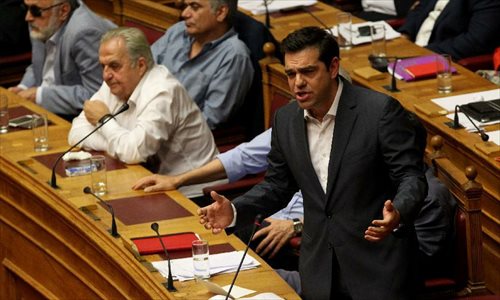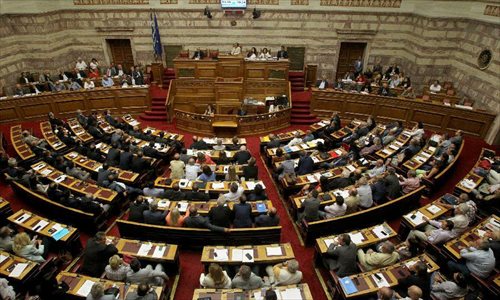HOME >> WORLD
Greek parliament approves bailout deal
Source:Xinhua Published: 2015-7-16 11:04:20

Greek Prime Minister Alexis Tsipras addresses the Parliament during a debate on bailout deal, Athens, Greece, July 15, 2015. Tsipras on Wednesday called on his radical left Syriza party parliamentary group to remain united in critical times for the country, amid a string of anti-austerity strikes and protests. Photo: Xinhua

Greek Prime Minister Alexis Tsipras addresses the Parliament during a debate on bailout deal, Athens, Greece, July 15, 2015. Tsipras on Wednesday called on his radical left Syriza party parliamentary group to remain united in critical times for the country, amid a string of anti-austerity strikes and protests. Photo: Xinhua
Greek parliamentarians on Thursday approved a bill with an overwhelming majority to give the go-ahead to the debt deal the government reached Monday with international creditors.The parliament also agreed on the first round of reform measures requested as prerequisites for the immediate release of international aid to avert debt default and Grexit, or a Greek exit from the European Union (EU).
The bill, passed with 229 votes in favor, 64 against and six abstentions, paved the way for finalizing the third Greek bailout and introduced a first set of taxation and pension system reform measures.
The bill won support from three main pro-euro opposition parties, but the government suffered a severe blow from the 39 dissenters within the ruling left-wing SYRIZA party of Prime Minister Alexis Tsipras.
Thirty-two SYRIZA legislators voted No, while six opted for abstention and one was absent out of all 149 seats the party holds in the assembly. Among deputies who voted against the bill after openly rejecting the deal as unviable and destructive for Greek economy and society, were Minister of Productive Reconstruction Panagiotis Lafazanis, Deputy Social Insurance Minister Dimitris Stratoulis and Deputy Defense Minister Kostas Isichos. Parliament Speaker Zoe Konstantopoulou, former Finance Minister Yanis Varoufakis, and Nadia Valavani who resigned on Wednesday from the post of deputy finance minister, were also among prominent SYRIZA members voting against the bill.
Tsipras' junior coalition partner, the Right-wing Independent Greeks party which holds 13 seats in parliament, backed the deal and the reforms despite reservations over certain aspects.
Addressing the assembly shortly before the voting, the prime minister repeated that the government did not believe in several painful measures, such as further tax hikes, the abolishment of early retirement and other reforms, but was forced to implement them.
Tsipras talked about an "unequal battle" when the country faced the lenders' ultimatum to seal a new bailout or head toward financial collapse and Grexit. He stressed that despite the unfavorable outcome Greece "left a legacy of dignity and democracy for Europe and the world." "If you believe that the threat is real, there is no other option than sharing the burden of the responsibility," Tsipras said, making a plea for national unity.
After the voting, the Greek leader was expected to proceed with a wide cabinet reshuffle on Thursday, according to local political analysts. Lawmakers who participated in the "mutiny" stressed that their votes should not be interpreted as a no-confidence vote to the government and assured that its stability was not at stake. However, media commentators noted that the widening rift within the SYRIZA party indicated that the government will face more troubles in other critical voting expected in coming weeks. Greece needs to meet strict timetables in coming days and weeks to ensure that the new three-year bailout will be finalized this summer and that vital international funding will resume so that the country's national stability can gradually be restored.
For the time being, the country has been in arrears to the International Monetary Fund since July 1, banks have been closed since June 29 and cash withdrawals from ATMs are still restricted to 60 euros per debit card daily. As Greek officials and lenders seek a formula for the disbursement of some emergency funds in coming days on time so that the country meets the next loan repayment to the European Central Bank due on Monday, the government also faces a new wave of anti-austerity strikes and protests against the deal.
The public sector trade union ADEDY and pharmacists held a first 24-hour nationwide strike on Wednesday, which disrupted public transport for a few hours and shut down public services. The protest staged by ADEDY and leftist parties in front of the parliament on the Syntagma square on Wednesday evening as deputies were debating the bill ended in violent clashes between groups of hooded anarchists and anti-riot police.
Dozens of anti-establishment youth infiltrated the peaceful march of about 10,000 demonstrators, and started hurling rocks and fire bombs against the police, while others were smashing ATMs and overturned a television channel's vehicle. The police responded by firing tear gas canisters to disperse the crowd. No injuries have been reported, while around 40 persons have been detained, according to police sources.
Posted in: Europe